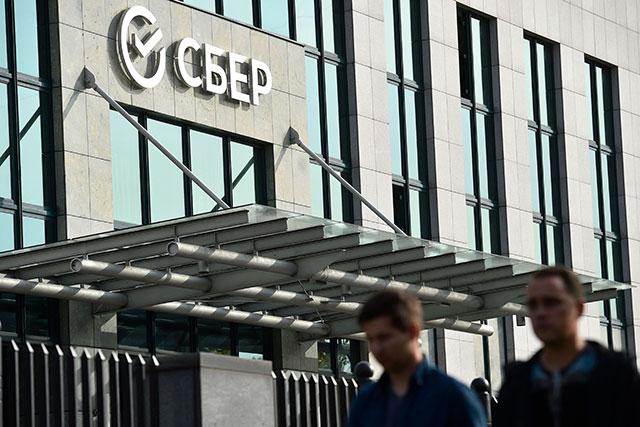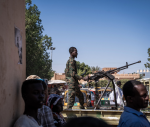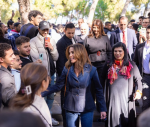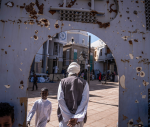You are here
Putin says ‘foolish’ sanctions will not hold back Russia
By Agencies - Oct 02,2014 - Last updated at Oct 02,2014
MOSCOW — President Vladimir Putin dismissed Western sanctions as "utter foolishness" on Thursday and said they would not stop Russia developing into a stronger economic power.
Attempting to take the higher ground in a speech to foreign and Russian investors, Putin said he was relaxed about the measures imposed on his country over Ukraine even though they had broken the fundamental principles of the global economy.
Addressing financiers worried about the weakening economy, capital flight and a possible increase in state intervention, he said Russia was well placed to weather the storm.
"We truly want a country that is strong, flourishing, free and open to the world," he told the VTB Russia Calling investment conference, ruling out restrictions on capital and currency movements out of Russia.
Making clear his aim was to soothe worried investors, he later began a question-and-answer session by saying with a wry smile: "All I have to do is smile to show the devil is not as frightening as he seems."
Contradicting some businessmen who fear sanctions could drive Russia into a new period of isolation, Putin underlined that he saw the country as part of the world economy, and, compared with others, a member playing by the rules.
He said sanctions violated the principles of the World Trade Organisation, undermined the credibility of international financial institutions and reserve currencies, and would cause long-term damage to the entire global economy.
"It is utter foolishness from those governments, which are limiting their business, preventing it working, reducing its competitiveness, freeing up niches for competitors on as promising a market as Russia," he indicated.
"I would like to hope that we can get over this period of misunderstanding," he added to applause.
Calm and relaxed
It was a calm performance by the 61-year-old president, who won popularity in his first spell as president from 2000 until 2008 by overseeing nearly a decade of economic growth.
Now some economists, including the World Bank, see Russia entering a period of near stagnation, with growth of the $2 trillion economy barely climbing above zero.
Inflation is running at an annual rate of almost 8 per cent, the ruble has fallen around 17 per cent against the US dollar this year and the price of oil — vital to Russia's economy — has dropped below the point at which it balances its budget. Capital flight was $75 billion in the first half of the year.
Plenty of experts see more problems than Putin appears ready to acknowledge, including the absence of a clear strategy to pull the world's eighth largest economy around.
"Right now it is clear that in this crisis situation for business there is no clear 'Plan B' from the state," said Diana Kaplinskaya, an economic analyst.
Acknowledging the "difficult times", Putin said he was sure the sanctions would spur domestic growth and reduce Russia's dependence on imports, enabling the economy to develop.
He expressed confidence that a recent rise in inflation, linked to Russia's restrictions on Western food imports as a response to sanctions, would be temporary given the central bank's policy — which is "balanced and flexible".
Putin reiterated the importance of developing ties with Russia's partners to the east, congratulating companies which had already done deals with Chinese companies and noted that Russia would aim to shift to national currencies in trade.
In a message to owners of firms privatised in the 1990s, when the Soviet Union's collapse gave way to chaotic capitalism, he said there would not be a wide-scale revision of such sales.
A Moscow court's decision last month to order the seizure of the stake in oil producer Bashneft belonging to oil-to-telecoms conglomerate Sistema, and the placing of its oligarch boss under house arrest, has raised investors' fears that the Kremlin wants to reclaim prized assets.
Putin said he would not interfere in the legal case.
Asked about the conflict in Ukraine, where Russia denies sending troops and weapons to support pro-Russian separatists, he said the former Soviet republic was Russia's "closest, most brotherly nation" and hoped a parliamentary election on October 26 would help bring stability to the country.
But overall, his message to those governments who imposed sanctions on Russia over its policy in Ukraine was clear — you will lose out.
Separately, the head of Russia's largest bank delivered on Thursday a blistering attack on Moscow's economic policies, warning that Russia could repeat the fate of the Soviet Union.
Speaking at an investment conference in Moscow, Herman Gref, chief executive of state-run Sberbank, pilloried a state-led model of economic development, pointing to a lack of competition and poor governance.
"Why did the Soviet Union break up?" Gref, a former liberal economy minister, told foreign and Russian investors.
"There is one key reason which determined the rest: it's mind-boggling incompetence of the Soviet leadership. They did not respect the laws of economic development," he said at the annual "Russia Calling" investment forum.
Citing a book by the key architect of Russia's market reforms, Yegor Gaidar, "Collapse of an Empire", Gref said Russia must learn lessons from history.
"We cannot allow the same situation," he said, noting that the Soviet Union also faced a combination of high oil prices and "huge structural problems”.
Russians officials are mulling how to mitigate the negative effects of Russia's confrontation with the West over Ukraine which include huge downward pressure on the ruble and intensified capital flight.
Washington and Brussels have introduced several rounds of sanctions against Moscow, and Russia responded by ordering a ban on European Union (EU) and US food and threatened to ban other imports.
The sanctions tit-for-tat coupled with the prosecution of billionaire Vladimir Yevtushenkov have severely undermined investor confidence and delivered a heavy blow to economy, which is on the brink of recession.
Gref appeared to question the Kremlin's policies including the ban on imports.
"I beg your pardon but we import nearly everything," said Gref, who has been widely praised for overhauling Russia's Soviet-era lender.
He also pointed to an increasingly weakening ruble, saying that even if the national currency bounces back somewhat, consumer prices would not go down.
"We don't have enough competition. Half of our economy is monopolised," he indicated.
He appeared to target the state's increasingly repressive policies and what many analysts call the state's excessive role in the economy.
"You cannot motivate people through the Gulag — like in the Soviet Union," he said. "People cannot make creative products when they don't understand the current economic policies and business climate."
Gref said that "we won't fix anything before we fix the environment," and he lamented that his efforts to establish special economic zones while he served as economy minister did not bear much fruit.
"Zones have been created but there are no incentives," he said. "Zones are not something encircled by a fence, not always," he added, alluding to prison camps.
Economy Minister Alexei Ulyukayev for his part said the current combination of 8 per cent inflation and growth of gross domestic product below 1 per cent was a "crass and explosive situation".
Related Articles
MOSCOW — Russia's giant state-owned bank Sberbank said on Thursday it recorded a 10 per cent drop in net profit last year as a result of the
Russia may have to spend more than $40 billion this year to avert a banking crisis, as the growing likelihood of a sharp recession threatens to pile extra costs on a sector suffering from Western sanctions over Ukraine and a plunge in the ruble.
MOSCOW — In central Moscow, retired businessman Igor Inkin is preparing to turn down simple pleasures like dessert as the value of the ruble















